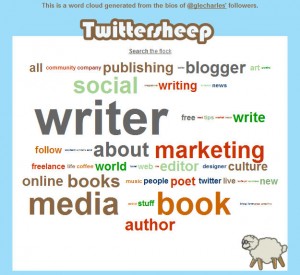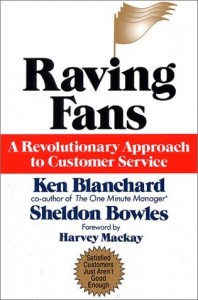On Twitter: Always Add Value
I find it hard to believe that as recently as six months ago, I was dismissing Twitter as a pointless ripoff of Facebook’s status update, without any of the extras that make Facebook a “real” social network. From what I’d seen, it lived up to its negative reputation of mindless updates about eating lunch, waiting in traffic and unimaginative opinions on the pop culture distraction of the moment.
(Note: I’ve certainly been guilty of the latter, though in relative moderation; I vow to NEVER live-tweet a whole episode of American Idol!)
When I decided to start using Twitter for more than updating my Facebook status, and began to actively seek out quality tweeters in the publishing and media world to follow, I had a revelation.
The image above is from Twittersheep, “a word cloud generated from the bios” of the 200+ people currently following me on Twitter. The emphasis on “writer”, “media”, “book” and “marketing” tells me that I’ve tapped into the niche I was looking for and am, theoretically, adding value to that niche as the majority of my own tweets match up with those keywords. In fact, the number of people following me spiked dramatically a few weeks back during the Tools of Change conference, largely as a result of my following along on Twitter and adding my two cents to the conversation.
I’ll often throw in a little something about politics (check out @nprpolitics), pop culture (@Latinoreview), sports (@matthewcerrone), or how much I want to stab someone on any given day, but I expect the same additional personal spice from those I follow, too, as long as their primary focus remains on publishing, or in some cases, my peripheral interests.
Twitter is not for everyone, but I find the precision required to get your point across in only 140 characters without resorting to “text speak” a particularly inspiring endeavor that’s useful in many other forms of communication, from email to poetry. I’m actually rather surprised at the number of poets I know who dismiss it, especially slam poets, instead of rising to the challenge and turning it into a new creative form.
Beyond poetry, though, there are niches were it is an invaluable social networking tool, a perfect complement to blogging, an in-the-moment StumbleUpon, and absolutely nothing like Facebook or LinkedIn.
Publishing is definitely one such niche.


 When my CEO sent me a friend request on Facebook last year, I had to rethink how I was using the site.
When my CEO sent me a friend request on Facebook last year, I had to rethink how I was using the site.

